In the month of May we celebrate Memorial Day, a time to honor the men and women who died fighting our country’s wars—and, by extension, all veterans. During this week back in 1905 America was celebrating the remarkable story of a very special veteran—for on 13 May 1905, Hiram Silas Cronk died, the last surviving veteran of the War of 1812.
Hiram Cronk Featured in Duffy’s Whiskey Ads
On the day the old American solider turned 105, two weeks before his death, a whiskey company used Cronk’s longevity to help market its product. This newspaper advertisement was published by the Evening Press.

The Death & Funeral of Hiram Cronk
The now famous Hiram Cronk died as he had lived, quietly on his farm in New York, but his death and funeral were reported in newspapers all across the United States. The city of New York lavished a state funeral on the venerable veteran, with full military honors. Tens of thousands paid their respects by filing past Hiram Cronk’s body lying in its coffin in the rotunda of New York City Hall.
Cronk’s death was seen as the passing of an era, for his lifetime embraced almost the entirety of the country’s history. He was born in 1800 during the administration of the nation’s second president John Adams; fought in the War of 1812; lived the entire length of the 19th century as the U.S. became a world power and one of the richest nations on earth; and died just nine years before the outbreak of World War I—with all its modern weaponry including tanks, airplanes and poison gas.
The Life & Family of Hiram Cronk
Until almost the very end of his life, Cronk received little publicity or fame for his U.S. military service in the War of 1812. After the war he earned his living as a shoemaker, then later bought some land in New York and became a farmer. In 1825 he married Mary Thornton; the couple had seven children and were married 60 years, Mary dying in 1885. He had 14 grandchildren and 8 great-grandchildren at the time of his death. One of his descendants, Jane, lived to over 100 years of age as well, making the two “serial centenarians.”
Cronk Finally Becomes Famous for His Good Genes
It was not until 1900, when the start of a new century coincided with his 100th year, that newspapers began to pay Hiram Cronk much attention. Typical of the notices that ran that year is this pension notice, published by the Springfield Daily Republican.

When Cronk was 101 the following article was published, emphasizing that he was the last surviving veteran of the War of 1812, and giving some interesting personal information—such as the fact that longevity ran in his family, and that he had used tobacco and strong liquor all his life!
This newspaper article was published by the Inter Ocean and reprinted by the Daily Picayune.
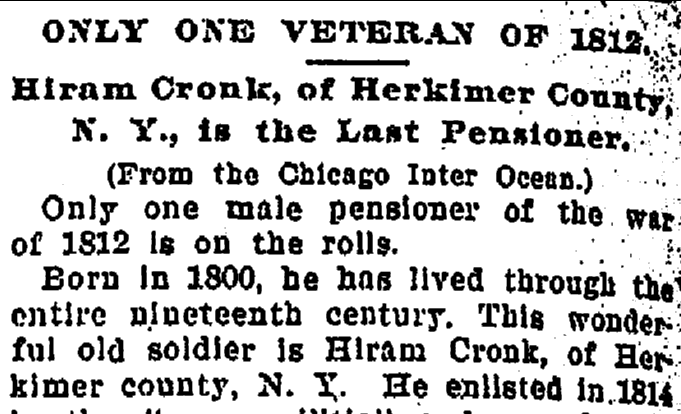
The news article goes on to report further on Cronk and his family’s genealogy:
At the age of 101 years Mr. Cronk is still hale and hearty and, all things considered, remarkably active. He lives within a short distance of his birthplace. Except for his absence during the war, he has seldom left the vicinity.
Cronk’s family is locally famous for longevity. Four brothers and a sister lived to be over 90 years old, and one to the age of 98. A family reunion was held on Hiram Cronk’s 100th birthday. It was attended by over 100 descendants and relatives.
The veteran is a lifelong Democrat. He cast his first vote for Andrew Jackson and his last for Grover Cleveland. When asked why he has not since voted the old gentleman remarks good-naturedly: “When I got down to Grover I calculated it was time to quit and call it a half day.”
From a very early age Cronk has been a habitual user of tobacco. He both chews and smokes. Recently he has threatened to break the habit. He is afraid, he says, that the use of the weed may become a habit with him. He has drunk strong liquor throughout his life, but always in moderation.
The veteran has every attention and bids fair to live for some time yet. He makes his home with his youngest daughter, a mere chit of a girl of 80.
Three days after Cronk turned 104 this newspaper article was published by the Boston Journal.
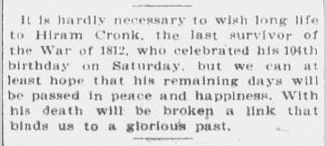
Note that last line, a theme that reverberated when Cronk passed away the next year: “With his death will be broken a link that binds us to a glorious past.”
Publicity for Hiram Cronk—and the resulting fame—really increased in the winter of 1904-05, when the old man became seriously ill and death seemed imminent, as reported in this news article published by the Evening Press.

The article about the old soldier goes on to say:
He had run the whole gamut of personal and business vicissitude, has found some consolation in the lean years and a greater joy in the last years, and was a cheery old optimist through all. Since last April the sluggishness has made itself felt and a natural sleep has, from day to day, taken up a greater number of the hours. Now he is sleeping his life away to the last sleep of all.
Conk’s Funeral Is Arranged while He Is Still Living!
Alarmed at Cronk’s deteriorating condition, New York City’s Board of Aldermen took the unusual step of arranging a grand funeral for the aged veteran—even though he was still alive! This newspaper article was published by the Duluth News Tribune.

The news article goes on to say:
…in the state of New York and in view of his honorable part in many battles of the War of 1812, it would be fitting that the chief city of the Empire State lead in honoring him by a soldier’s burial and that his remains lie in state in the City Hall.
Alderman McCall said that while he approved of the spirit of the resolution he thought it would be better to wait for the hero to die before providing for his funeral. The resolution finally was adopted by the following amendment:
“That in the event of the death of Mr. Cronk, the president of the Board of Alderman take cognizance of the fact and appoint a committee to provide for a public funeral and other honors of the dead hero.”
As you might expect, this business of arranging a funeral for a man still living was much remarked upon in the nation’s press, as the following humorous notices show.
This notice was published by the Springfield Daily Republican (Springfield, Massachusetts), 6 January 1905, page 13:
The New York Board of Aldermen are planning to give a public funeral to Hiram Cronk when he dies. He is the only survivor of the War of 1812 in New York. The news of such an honor may prove so exciting to the old man that it will kill him.
This notice was published by the Morning Oregonian (Portland, Oregon), 23 April 1905, page 6:
Hiram Cronk, the last survivor of the War of 1812, was 105 last Wednesday [correction: his birthday was April 29], but he refuses to die, although the New York aldermen have voted him a public funeral when he will accept. With such an inducement one would expect a rush for the tomb.
This notice was published by the Daily Picayune (New Orleans, Louisiana), 25 April 1905, page 6:
Some months ago the New York Board of Aldermen voted to give Hiram Cronk, the last survivor of the War of 1812, a public funeral. In spite of this inducement to die, Mr. Cronk decided to remain among us a while longer, and celebrated his 105th birthday on Wednesday last [correction: his birthday was April 29]. He won’t lose the State funeral by declining to accept it at this time; he can have it whenever it will be convenient to him.
There was a big celebration on April 29, 1905, when Cronk turned 105, as explained in this newspaper article published by the Sunday World-Herald.

The news article goes on to say:
Hiram Cronk, the only survivor of the War of 1812, was one hundred and five years old on April 29 and a patriotic celebration took place at his home at Ava, Oneida County, New York.
Every society in the United States of the Sons and Daughters of the War of 1812 sent a delegation to Ava, and all patriots’ military bodies and American citizens sent him greetings, gifts or tokens to show that his services for the country were and are appreciated.
Mr. Cronk was so weak during the winter that he was not expected to survive and elaborate funeral arrangements had been made, but he recovered thanks to Duffy’s Pure Malt Whiskey. By a special act of the New York City administration his remains, when he dies, will be interred in Mount Victory, a soldiers’ plot in Cypress Hills Cemetery.
Hiram Cronk Dies at Age 105
Exactly two weeks after his 105th birthday, Hiram Cronk died. This newspaper article was published by the Evening Press.
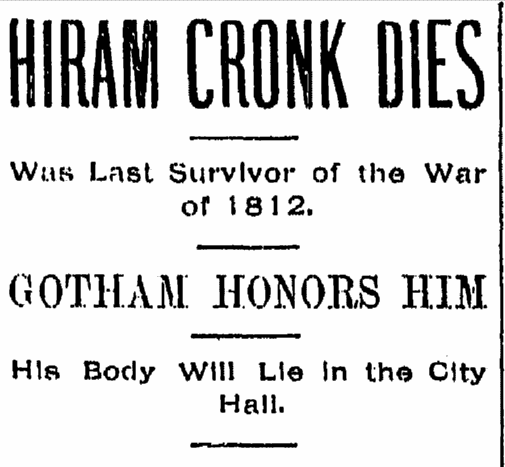
The news article goes on to say:
The body of Mr. Cronk will lie in state in the City Hall of New York and will be buried in Mt. Victory, Cypress Hills Cemetery, in Brooklyn, where more than half a hundred of his fellow soldiers in the War of 1812 have been laid at rest.
The nation mourned the death of Hiram Cronk, recognizing it truly was the passing of an era, as expressed in this newspaper article published by the Philadelphia Inquirer.
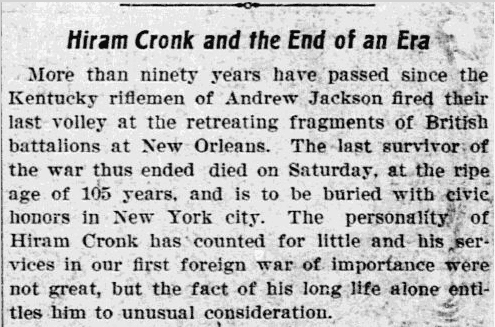
The news article goes on to say:
It calls to mind the brevity of our national existence. The [nineteenth] century-born Cronk was born during the Presidency of the elder Adams, when the total population was about that of Pennsylvania today, and when the cost of government was far less than the total appropriations just signed by Governor Pennypacker. He fought in the ranks against the troops of the same George III who ruled when the Revolution took place, a fact which so many intelligent people seem to have forgotten. He completed his career as a soldier before Napoleon was defeated at Waterloo and at a time when this nation was still an experiment.
Who could have imagined that this country would develop in wealth in the lifetime of a single man until it should become the richest on earth? That the population should grow to be the greatest of all non-Oriental nations, for we must place Russia essentially among the Eastern peoples? Who could have supposed that the life of one man would span that development in human activities which covered a period almost from the birth of steam as an active agent in human affairs?
In view of these things what may not be the possibilities of the future?
This comment was published by the Boston Journal (Boston, Massachusetts), 15 May 1905, page 6:
The world of sentiment and patriotic affection seems poorer through the death of Hiram Cronk, the last pensioner of the War of 1812, and undoubtedly the final survivor. The one human link that bound us of today with that struggle for the defense of our rights on the sea has gone. Now let us carefully cherish the naval relics that are left to us.
A grand parade escorted Hiram Cronk’s body to New York City Hall on May 17 so that it could lie in state for mourners to pay their respects, as reported in this newspaper article published by the Evening Press.

The news article goes on to say:
New York, May 17.—The body of Hiram Cronk, who lived to be the last survivor of the War of 1812, was brought here today from Boonville, N.Y., and will be laid away in Cypress Hills Cemetery with full military honors. The funeral will be held tomorrow and in the meantime the body will lie in state in the City Hall. Accompanying the body were Mr. Cronk’s three surviving sons and one daughter. They were Philander Cronk, 81 years old; William, 72 years old; John, 66 years old; and the daughter, Mrs. Sarah Rowley, 71 years old.
As the funeral cortege moved from the Grand Central Station to the City Hall it afforded an imposing and unusual spectacle. Led by a police escort of mounted officers, a detachment from the United States regular Army, the Society of 1812 and the Old Guard in uniform, came the hearse bearing the old warrior’s body. Around it, in hollow square formation, marched the members of the U.S. Grant Post, G.A.R. Then followed the Washington Continental Guard from Washington, D.C., the Army and Navy Union, and carriages with members of the Cronk family. Carriages with Mayor McClellan and members of the city government brought up the rear.
Details of Hiram Cronk’s body lying in state, as well as his funeral the following day on May 18, were reported in this newspaper article published by the Pawtucket Times.
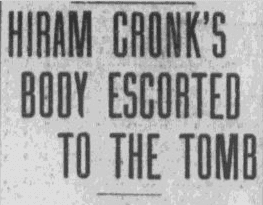
The news article goes on to say:
New York, May 18.—The body of Hiram Cronk, the last veteran of the War of 1812 to pass away, was buried today in Cypress Hills Cemetery with impressive military honors. Nearly threescore other soldiers who fought in the war of almost a century ago had lain for many years in the cemetery where their oldest comrade was placed today.
Since yesterday, when it was brought from Boonville, the body has been in the City Hall. All day yesterday, last evening and this forenoon there was a constant stream of men, women and children moving past the flower and bunting-covered casket in the city building—the first which had rested there since the body of Gen. Grant lay in state. One hundred and fifty policemen were required to keep the crowd moving and to keep clear the plaza in front of the building.
From the City Hall to the cemetery the body was escorted by a detail of mounted police, the Fourteenth Regiment, and a troop from the Second Brigade, National Guard of New York; delegations from U.S. Grant Post, G.A.R., and carriages containing relatives of the dead soldier and a committee from the Board of Aldermen representing the city. All along the route over which the funeral cortege passed the streets were lined with people. At the cemetery Marcus B. Taylor, chaplain of the Veteran Corps, conducted the burial service according to the Grand Army ritual.
With a volley of military gunfire and the playing of taps, Hiram Cronk was finally laid to rest, as reported in this newspaper article published by the Belleville News-Democrat.
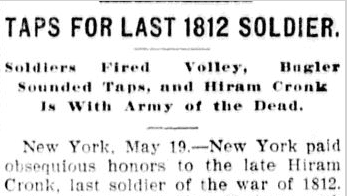
The news article goes on to say:
More than 50,000 New Yorkers, with bared heads, filed past the flower-covered bier in which the dead soldier lay in the City Hall. The expenses of the unusual, but befitting honors to him, are borne by the city.
The catafalque rested in the rotunda of the City Hall, draped with flags and flowers, while the building was draped in black. It was the first time since the death of Gen. Grant that a body has laid in state in the City Hall.
After the body had been lowered into the grave, at Cypress Hills Cemetery, a squad of soldiers fired a volley over the grave and a bugler sounded taps. Hiram Cronk was with the army of the dead.
Explore over 330 years of newspapers and historical records in GenealogyBank. Discover your family story! Start a 7-Day Free Trial

How wonderful that this man who fought in a pivitol war to save our country would be honored so well by the citizens of New York.
Yes, I agree, Carole. And not just the citizens of New York–newspapers all around the country reported the news of the death and funeral of Hiram Cronk, because readers everywhere were interested in his story and, by extension, wanted to pay their respects.
I am one of many his decedents. My son is attending the USMMA at Kings Point located at Great Neck Long Island. Is there any historical sites that he can visit to walk in the footsteps of his ancestors? Thanks for this wonderful article.
My grandmother left me an old newspaper clipping showing that he received a veteran’s allowance for his injury for the War of 1812. Congress was able to retire that fund on notice of his death.
Thanks for your response, Rob. I’m not personally aware of any historical sites there, but here is their official website and perhaps that can be of help:
http://www.usmma.edu/
hi ; i have a hiram cronk dead. ava n.y. may 15th.its from a news paper chicago tribune 1905.its cool to know that i have one of i’m sure is a very rare obituary.